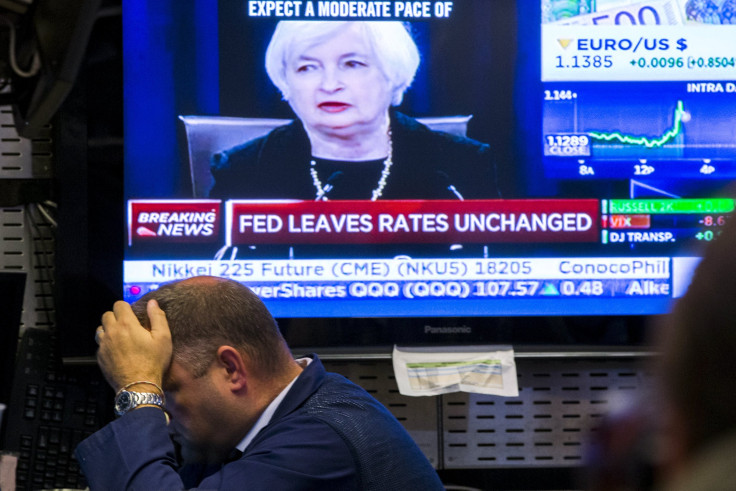Dow Jones Industrial Average Drops As Wall Street Weighs Fed Rate Hike Decision

U.S. stocks closed lower Thursday after witnessing major volatile swings in afternoon trading as Wall Street digested comments from Fed Chairwoman Janet Yellen. After trading flat following the central bank’s initial statement that left interest rates unchanged, the Dow rose nearly 200 points during Yellen’s speech, only to reverse and trade lower after she left the door open to hiking rate as early as October.
On the day, the Dow Jones Industrial Average (INDEXDJX:.DJI) lost 65.21 points, or 0.4 percent, to close at 16,674.74. The Standard & Poor's 500 index (INDEXSP:.INX) edged down 5.11 points, or 0.26 percent, to 1,990.20. However, the Nasdaq composite (INDEXNASDAQ:.IXIC) added 4.71 points, or 0.10 percent, to 4,893.95.
Six of the 10 S&P 500 sectors closed lower, led by declines in telecom and financial stocks. Utilities were the largest gainer, up 1.3 percent.
The yield on the 10-year Treasury note fell to 2.22 percent as investor expectations for a rate hike this year declined. The drop in yields helped push interest-rate-sensitive sectors, such as utilities, higher.
Meanwhile, the U.S. dollar dipped against major world currencies, with the euro trading at $1.14.
Oil prices closed lower Thursday, a day after U.S. crude rallied nearly 6 percent after crude oil inventories unexpectedly fell. West Texas Intermediate crude, the benchmark for U.S. oil prices, fell 0.6 percent to $46.86 per barrel for October delivery on the New York Mercantile Exchange. On the London ICE Futures Exchange, Brent crude lost 1.2 percent to $49.16 a barrel.
Ahead of the statement, investors weighed a series of data points showing groundbreaking on U.S. single-family homes declined in August, while building permits rebounded, signaling strength in the housing market. Housing starts declined 3 percent in August to 1.126 million at a seasonally adjusted annualized rate, while starts were 1.161 million in July, revised down from 1.206 million, the Commerce Department said Thursday.
Separately, fewer Americans filed new applications for unemployment benefits last week, marking the 28th straight week that claims remained below the 300,000 threshold, the longest such stretch since the 1970s. Claims below the 300,000 threshold are considered a mark of a strengthening labor market.
© Copyright IBTimes 2024. All rights reserved.





















